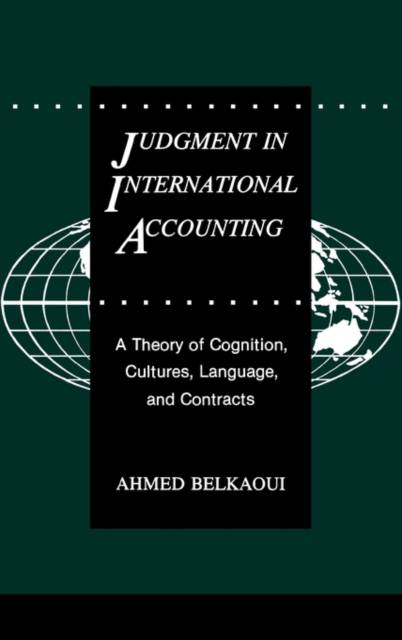
- Retrait gratuit dans votre magasin Club
- 7.000.000 titres dans notre catalogue
- Payer en toute sécurité
- Toujours un magasin près de chez vous
- Retrait gratuit dans votre magasin Club
- 7.000.000 titres dans notre catalogue
- Payer en toute sécurité
- Toujours un magasin près de chez vous
Judgment in International Accounting
A Theory of Cognition, Cultures, Language, and Contracts
Ahmed Riahi-Belkaoui, Ahmed BelkaouiDescription
Belkaoui offers a thorough examination of the various factors that affect the judgment/decision process in an accounting setting. As the author notes at the outset, an appreciation of the various influences on accounting decisionmaking is of critical importance to users, preparers, and verifiers of accounting information--particularly in an era of multinational corporations and global markets. In order to explain the judgment process in accounting, Belkaoui proposes a new theoretical model which assumes both that a cognitive process guides judgments and decisionmaking in accounting and that the schemata underlying this process are shaped by the crucial factors of national culture, language, organizational culture, and contractual agreements. The author examines each of these influences in turn, offering a comprehensive guide to the practitioner and researcher seeking empirical hypotheses to explain the judgment process in the international accounting arena.
The bulk of the volume is devoted to an in-depth examination of each of the five relativisms which affect the accounting judgment/decision process--cognitive, cultural, linguistic, organizational, and contractual. In each chapter, the author explores the theory and findings underlying these relativisms in the social sciences and their contribution to explaining the judgment/decision process in accounting. The final chapter synthesizes the preceding material and develops an international accounting theory based upon the judgment/decision model. Throughout, Belkaoui focuses on the complexity and richness of the judgment/decision process, cautioning that the evaluation of any accounting information must take into account the various critical influences on this process.Spécifications
Parties prenantes
- Auteur(s) :
- Editeur:
Contenu
- Nombre de pages :
- 144
- Langue:
- Anglais
Caractéristiques
- EAN:
- 9780899304717
- Date de parution :
- 20-02-90
- Format:
- Livre relié
- Format numérique:
- Genaaid
- Dimensions :
- 156 mm x 234 mm
- Poids :
- 381 g







